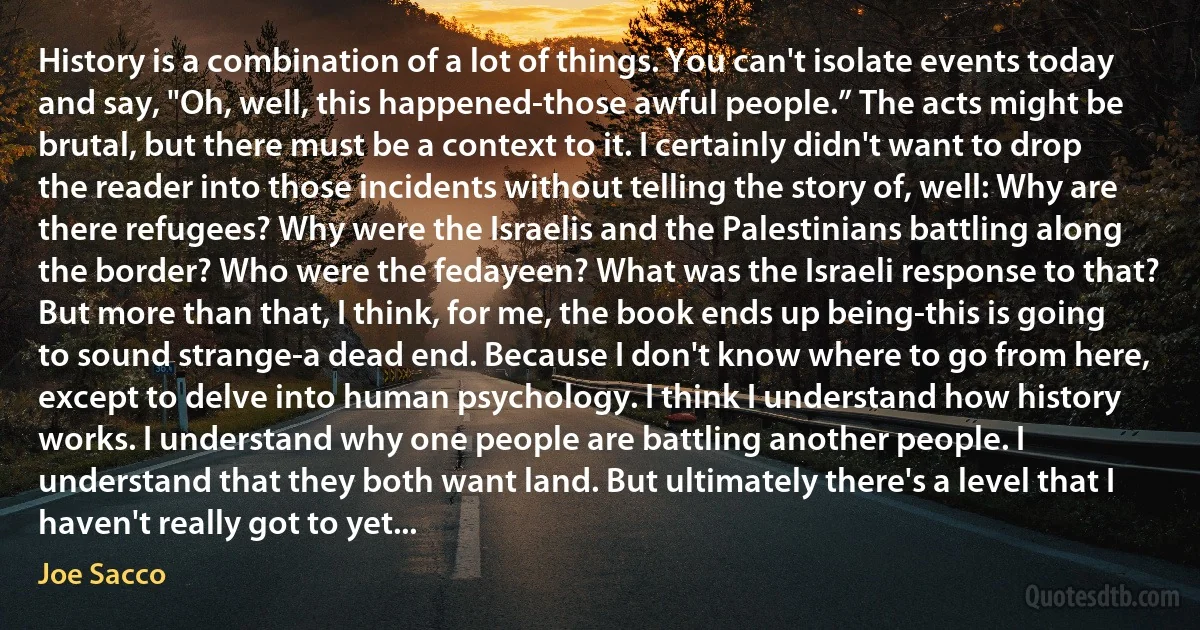
History is a combination of a lot of things. You can't isolate events today and say, "Oh, well, this happened-those awful people.” The acts might be brutal, but there must be a context to it. I certainly didn't want to drop the reader into those incidents without telling the story of, well: Why are there refugees? Why were the Israelis and the Palestinians battling along the border? Who were the fedayeen? What was the Israeli response to that? But more than that, I think, for me, the book ends up being-this is going to sound strange-a dead end. Because I don't know where to go from here, except to delve into human psychology. I think I understand how history works. I understand why one people are battling another people. I understand that they both want land. But ultimately there's a level that I haven't really got to yet...
Joe SaccoRelated topics
battling book context dead delve drop end history human isolate land might people psychology say sound story telling think well yet today works Acts Israeli things endsRelated quotes
Spontaneous social action will be broken up over and over again by State intervention; no new seed will be able to fructify. Society will have to live for the State, man for the governmental machine. And as, after all, it is only a machine whose existence and maintenance depend on the vital supports around it, the State, after sucking out the very marrow of society, will be left bloodless, a skeleton, dead with that rusty death of machinery, more gruesome than the death of a living organism. Such was the lamentable fate of ancient civilisation. ... Already in the times of the Antonines (IInd Century), the State overbears society with its anti-vital supremacy. Society begins to be enslaved, to be unable to live except in the service of the State. The whole of life is bureaucratised. What results? The bureaucratisation of life brings about its absolute decay in all orders.

José Ortega y Gasset
The Israeli-Palestinian conflict has been a tragedy, a clash between one very powerful, very convincing, very painful claim over this land and another no less powerful, no less convincing claim. Now such a clash between right claims can be resolved in one of two manners. There's the Shakespeare tradition of resolving a tragedy with the stage hewed with dead bodies and justice of sorts prevails. But there is also the Chekhov tradition. In the conclusion of the tragedy by Chekhov, everyone is disappointed, disillusioned, embittered, heartbroken, but alive. And my colleagues and I have been working, trying...not to find the sentimental happy ending, a brotherly love, a sudden honeymoon to the Israeli-Palestinian tragedy, but a Chekhovian ending, which means clenched teeth compromise.

Amos Oz
I was surprised, while preparing this lecture, to notice how, among my friends who had read the book, a division into two groups appeared. Both groups are equally discerning and educated, and as far as I can tell, equal in numbers. One group is eager to say that they don't understand a word of it, and there are artists and historians among them. Those of the other group claim that they understood it all on first reading, without difficulty. Of course I believe them both, without understanding the combination that separates them so sharply. Perhaps distinctive and contrasting features in the comprehension of works of art are responsible. What I say speaks to some, but not to others. Some are ready, and others are not. But when both someday find that they agree in understanding it, that day may be its last as a book alive in the dissension over its intelligibility.

George Kubler
If the Europeans are telling the truth in their claim that they have killed six million Jews in the Holocaust during the World War II - which seems they are right in their claim because they insist on it and arrest and imprison those who oppose it, why should the Palestinian nation pay for the crime. Why have they come to the very heart of the Islamic world and are committing crimes against the dear Palestine using their bombs, rockets, missiles and sanctions. [...] The same European countries have imposed the illegally-established Zionist regime on the oppressed nation of Palestine. If you have committed the crimes so give a piece of your land somewhere in Europe or America and Canada or Alaska to them to set up their own state there. Then the Iranian nation will have no objections, will stage no rallies on the Qods Day and will support your decision.

Mahmoud Ahmadinejad
Justice is the end of government. It is the end of civil society. It ever has been, and ever will be, pursued, until it be obtained, or until liberty be lost in the pursuit. In a society, under the forms of which the stronger faction can readily unite and oppress the weaker, anarchy may as truly be said to reign, as in a state of nature where the weaker individual is not secured against the violence of the stronger: And as in the latter state even the stronger individuals are prompted by the uncertainty of their condition, to submit to a government which may protect the weak, as well as themselves: so in the former state, will the more powerful factions be gradually induced by a like motive, to wish for a government which will protect all parties, the weaker as well as the more powerful.

Alexander Hamilton
